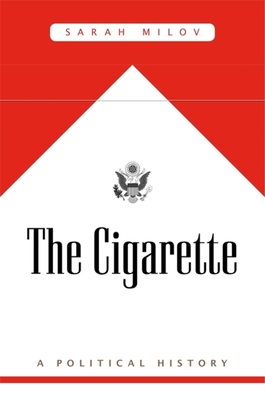

 Harvard University Press
Harvard University Press
The Cigarette: A Political History


Key Metrics
- Sarah Milov
- Harvard University Press
- Paperback
- 9780674260313
- -
- -
- History > United States - 20th Century
- English
 Secure Transaction
Secure TransactionBook Description
Finalist for the Hagley Prize in Business History
A Smithsonian Book of the Year
Vaping gets all the attention now, but Milov's thorough study reminds us that smoking has always intersected with the government, for better or worse.
--New York Times Book Review
An impressive work of scholarship evincing years of spadework...A well-told story.
--Wall Street Journal
A nuanced and ultimately devastating indictment of government complicity with the worst excesses of American capitalism.
--New Republic
If you want to know what the smoke-filled rooms of midcentury America were really like, this is the book to read.
--Los Angeles Review of Books
Tobacco is the quintessential American product. From Jamestown to the Marlboro Man, it powered the nation's economy and shaped some of its most enduring myths. The story of tobacco's rise and fall may seem simple enough--a tale of science triumphing over corporate greed--but the truth is more complicated.
After the Great Depression, government officials and tobacco farmers worked hand in hand to ensure that regulation was used to promote tobacco rather than protect consumers. As evidence of the connection between cigarettes and cancer grew, scientists struggled to secure federal regulation in the name of public health. What turned the tide, Sarah Milov reveals with her groundbreaking research, was a new kind of politics: a movement for nonsmokers' rights. Activists and public interest lawyers took to the courts, the streets, city councils, and boardrooms to argue for smoke-free workplaces and allied with scientists to lobby elected officials. The Cigarette puts politics back at the heart of tobacco's rise and fall, dramatizing the battles over corporate influence, individual choice, government regulation, and science.
Author Bio
I am a historian of the twentieth century United States. My work focuses on how organized interest groups and everyday Americans influence government policy and the terms of political debate. Right now I'm beginning a project that examines the relationship between gender and whistleblowing in the modern United States.
I begin from the premise that there was something constitutive and not coincidental about the simultaneous rise of women in the workforce and the proliferation of whistleblower protection laws beginning in the 1970s. At the same time, strategies used by corporations and government bureaucracies to discredit whistleblowers--regardless of gender--frequently cast them in feminized, hysterical terms.
By looking at the intertwined history of whistleblowing and gender, I hope that three dynamics central to the history of knowledge, capitalism, and modern politics become more clear: new knowledge—and new risks— created by the movement of women into jobs traditionally held by men; the promise and perils of claiming authority as women or sexual minorities; and the gendered techniques of corporate crisis management.
My first book, The Cigarette: A Political History is a history of tobacco in the twentieth century that places farmers, government officials, and citizen-activists at the center of the story. Rather than focusing exclusively on "Big Tobacco," I argue that domestic and global cigarette consumption rose through the efforts of organized tobacco farmers and US government officials; and that it fell as a result of local government action spurred by the efforts of citizen-activists and activist lawyers.
The Cigarette won the PROSE Award for North American History from the Association of American Publishers. It was a finalist for the LA Times Book prize and one of Smithsonian Magazine's "Best History Titles of 2019."
Education
- Ph.D. Princeton University, 2013
- M.A. Princeton University, 2009
- B.A. Harvard , 2007
Source: University of Virginia - Department of History
Community reviews
Write a ReviewNo Community reviews




